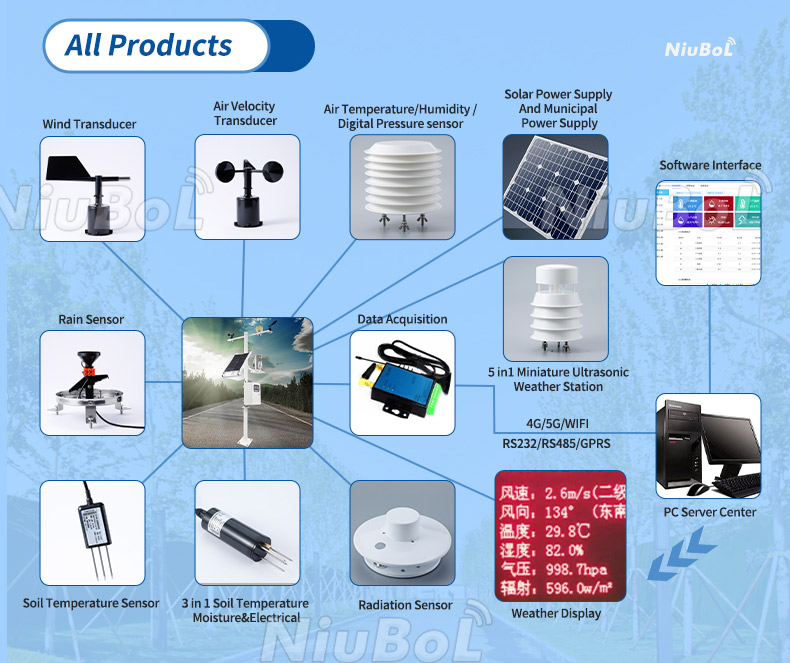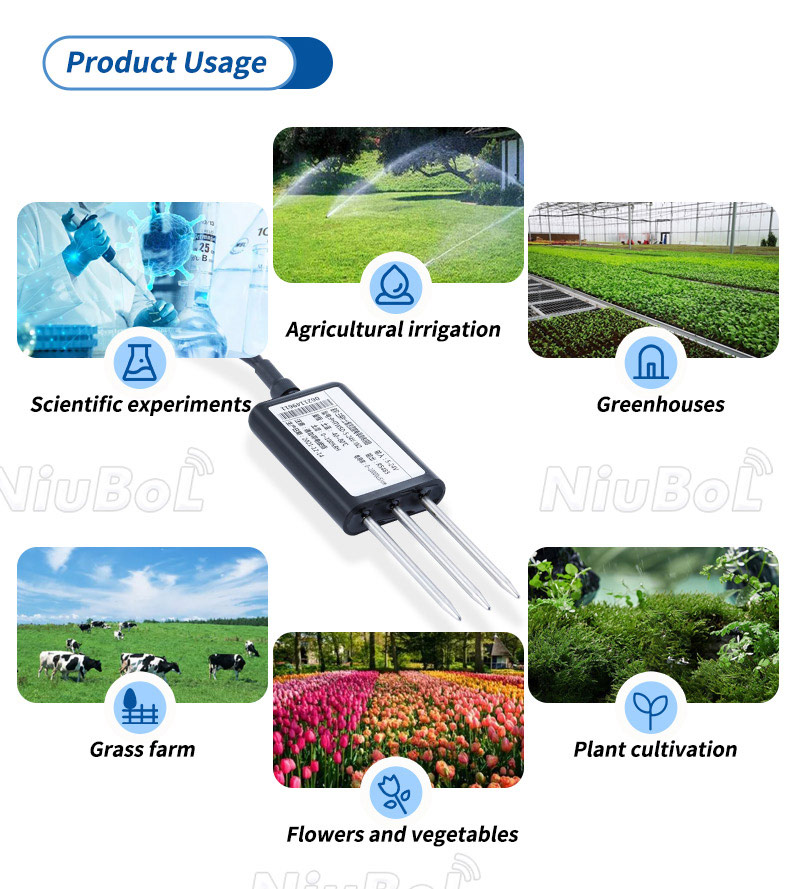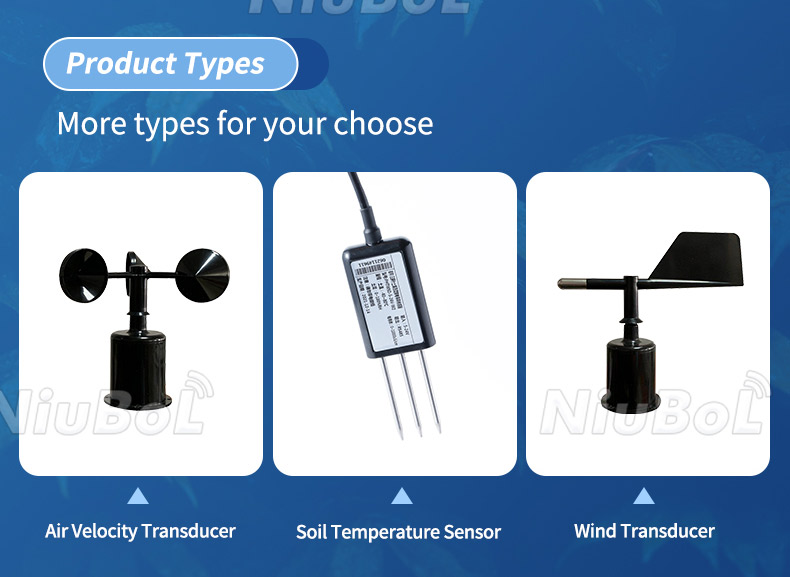

— Blogs —
—Products—
 Consumer hotline +8618073152920
Consumer hotline +8618073152920 WhatsApp:+8615367865107
Address:Room 102, District D, Houhu Industrial Park, Yuelu District, Changsha City, Hunan Province, China
Product knowledge
Time:2024-01-07 15:12:39 Popularity:407
Farmland monitoring: Arranging soil test sensors in farmland can monitor soil parameters such as nutrients, humidity and temperature in real time, helping farmers to understand the soil condition, formulate reasonable fertiliser application and irrigation plans, and improve the yield and quality of crops.
Precision agriculture: The use of soil test sensors can achieve precision agriculture management, through the accurate monitoring and management of farmland, to achieve differentiated fertiliser application, irrigation and plant protection, improve resource use efficiency and reduce environmental pollution.
Plant growth research: In plant growth research, the use of soil test sensors can monitor the impact of the soil environment on plant growth, understand the laws and characteristics of plant growth, and provide data support for plant physiology, ecology and other disciplines.
Land improvement: The use of soil test sensors can monitor soil parameters such as acidity and alkalinity, salinity, etc., and take corresponding improvement measures to improve the quality of the soil and enhance the productivity and adaptability of the land.
Environmental monitoring: in the field of environmental monitoring, soil test sensors can be used to monitor the soil pollution status, soil erosion and other aspects of environmental protection and governance to provide data support.
Hydrological monitoring: In the field of hydrological monitoring, soil test sensors can be used to understand the groundwater level, soil water content and other information, providing data support for water resources management and hydrogeological research.
Urban greening: in urban greening, through the use of soil test sensors can understand the soil condition of urban green space, and take the necessary measures to improve the ecological environment of green space, and improve the effect of urban greening.
Programme 1: Farmland monitoring system
Application Scenario: Farmland
Function description: By arranging soil test sensors, real-time monitoring of farmland soil parameters such as nutrients, humidity, temperature, etc., and transmit the data to the cloud platform for storage and analysis. Based on the analysis results, a reasonable fertiliser and irrigation plan is formulated to improve the yield and quality of crops.
Programme 2: Precision Agriculture Management System
Application Scenario: Agricultural parks, large farms, etc.
Function description: Use soil test sensors and drones and other technical means to achieve precise monitoring and management of farmland. By arranging multiple sensor nodes, it builds a soil monitoring network, collects soil data in real time and uploads it to the cloud platform. Combined with GPS positioning technology and big data analysis, it achieves precise fertiliser application, irrigation and other agricultural management measures, improves resource utilisation efficiency and reduces environmental pollution.
Programme 3: Plant growth research experimental device
Application Scenario: Plant growth laboratory, scientific research institutions, etc.
Functional description: Simulate the impact of different soil environments on plant growth by using technical means such as soil test sensors and plant growth boxes. Through real-time monitoring of soil parameters and plant physiological indicators, we can understand the laws and characteristics of plant growth and provide data support for research in plant physiology, ecology and other disciplines.
Programme 4: Land improvement monitoring system
Application Scenario: Land treatment projects, abandoned land, etc.
Function description: Use soil testing sensors and UAVs and other technical means to monitor the effect of land improvement. By arranging sensor nodes, real-time monitoring of soil parameters such as acidity, alkalinity and salinity, and uploading the data to the cloud platform for storage and analysis. Combined with UAV aerial photography and GIS technology, it realises accurate monitoring and management of land improvement, and improves the productivity and adaptability of the land.
Programme 5: Environmental monitoring and governance system
Application Scenario: Polluted soil treatment projects, environmental protection projects, etc.
Functional description: Monitor soil pollution conditions, such as heavy metals, pesticide residues and other pollutant content through soil test sensors. Upload the data to the cloud platform in real time, and visualise it with GIS technology. Based on the monitoring results, develop corresponding management measures, such as soil cleaning and bioremediation, to protect the health of soil and groundwater resources.

Programme 6: Hydrological Monitoring System
Application Scenario: Rivers, lakes, reservoirs and other waters
Function description: Use the groundwater level and soil water content monitoring function of soil test sensors to build a hydrological monitoring system. By arranging sensor nodes, real-time monitoring of groundwater level and soil water content, and uploading the data to the cloud platform for storage and analysis. Combined with GIS technology, it realises fine management of water resources and provides data support for water resource protection, flood prevention and drought relief.


Programme 7: Urban Greening Intelligent Management Platform
Application Scenario: Urban green areas, parks, flower beds, etc.
Function Description: Monitor the soil condition of urban green space, such as pH value, nutrient content, etc. through soil testing sensors. Upload the data to the cloud platform and visualise it with GIS technology. Based on the monitoring results, provide scientific basis for urban greening, optimise plant planting and maintenance management, and improve urban greening effect and ecological benefits.
These solutions are only a part of the application of soil test sensors, and specific applications should be selected and adjusted according to the actual needs and scenarios. In fact, with the continuous development and innovation of technology, the application scenarios of soil test sensors will be more extensive and in-depth. In the future, we can look forward to the emergence of more innovative application solutions to provide more accurate and reliable data support for the development of agriculture, environment, water resources and other fields.
Prev:Why are soil sensors important?
Next:Soil test sensor application status and future development
Related recommendations
Sensors & Weather Stations Catalog
Agriculture Sensors and Weather Stations Catalog-NiuBoL.pdf
Weather Stations Catalog-NiuBoL.pdf
Related products
 Combined air temperature and relative humidity sensor
Combined air temperature and relative humidity sensor Soil Moisture Temperature sensor for irrigation
Soil Moisture Temperature sensor for irrigation Soil pH sensor RS485 soil Testing instrument soil ph meter for agriculture
Soil pH sensor RS485 soil Testing instrument soil ph meter for agriculture Wind Speed sensor Output Modbus/RS485/Analog/0-5V/4-20mA
Wind Speed sensor Output Modbus/RS485/Analog/0-5V/4-20mA Tipping bucket rain gauge for weather monitoring auto rainfall sensor RS485/Outdoor/stainless steel
Tipping bucket rain gauge for weather monitoring auto rainfall sensor RS485/Outdoor/stainless steel Pyranometer Solar Radiation Sensor 4-20mA/RS485
Pyranometer Solar Radiation Sensor 4-20mA/RS485
Screenshot, WhatsApp to identify the QR code
WhatsApp number:+8615367865107
(Click on WhatsApp to copy and add friends)